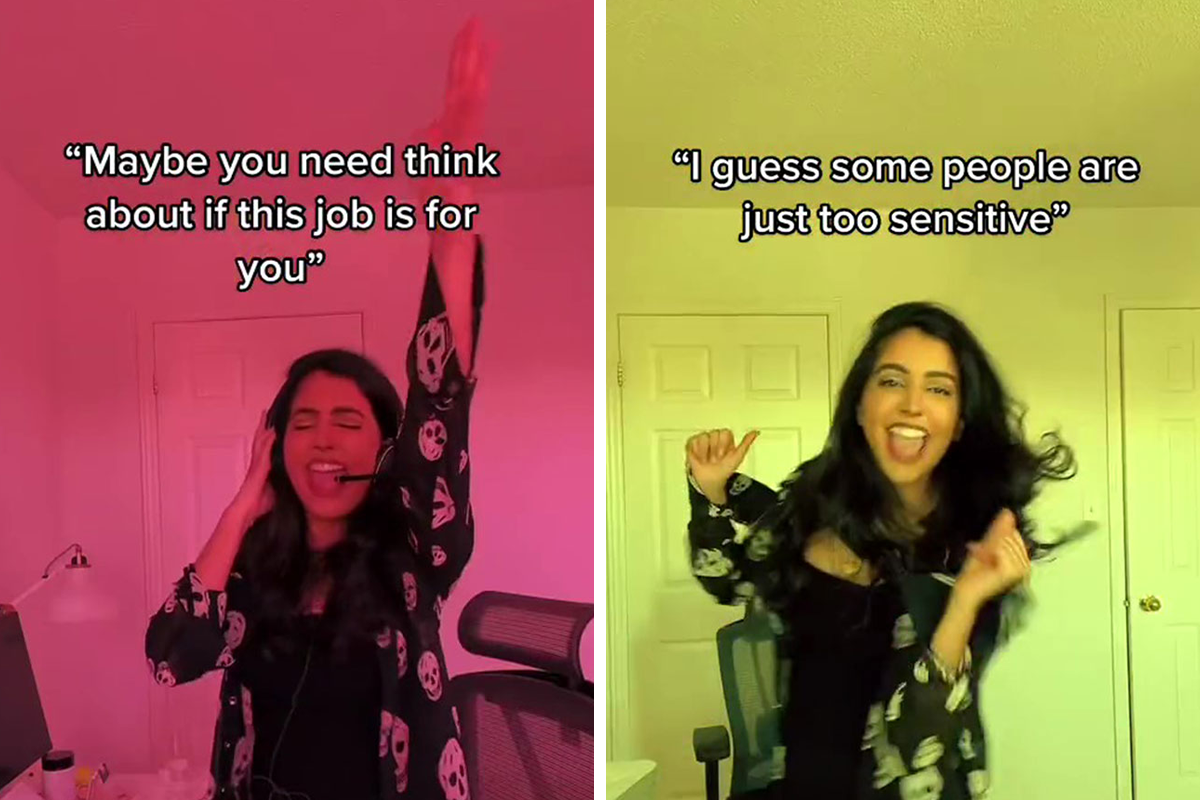
“This Is Why When They Ask How Things Are Going, The Only Safe Reply Is ‘Great'”: Woman Shares Toxic Things Her Manager Said When She Was Feeling Burnt Out
What do you expect to hear from a superior employee when something doesn’t work out for you at your job, or you just don’t feel very good emotionally? Probably, these will be some encouraging words, motivating examples, or something else like that. And probably the last thing you expect is sarcastic comments from the boss.
Unfortunately, despite the fact that most business coaches have been talking about the inadmissibility of toxic criticism from managers for several decades, such cases continue, and moreover, it, alas, seems to be a trend. As a result, companies are increasingly facing the problem of employee burnout.
Do you want a visual and creative example? Voila! TikToker @simiibrar from Toronto also found herself on the verge of burnout during her work – and guess what her boss said about this? Bingo!… And the employee collected the most “motivating” quotes in a video that went viral, gaining over 285.7K views.
More info: TikTok
The Original Poster faced burnout at her job and her manager just wanted to spur her on with sarcastic phrases
Image credits: Nenad Stojkovic (not the actual photo)
Image credits: @simiibrar
Some bosses really behave themselves like professional gaslighters
“I guess some people are just too sensitive.” It’s a great idea to blame an employee for not being diligent – many professional gaslighters use it willingly and then wonder why employees are increasingly burning out.
Image credits: @simiibrar
Each employee really needs an individual approach to their work
“Well, that’s part of the job, I am even doing it too.” Another common phrase. Interestingly, it is used for almost any situation – up to justifying the need for non-paid overtime. Yes, maybe the boss also does their own part of the job, but let’s reveal a terrible secret – all people are different. So everyone needs an individual approach.
Image credits: @simiibrar
Masked intimidation in the boss’ words is completely inappropriate
“Maybe you need to think about if this job is for you.” A clear threat of being fired, made worse by the fact that it is veiled in polite words. Maybe it would be even better if the boss directly (and loudly) pointed out the employee’s work shortcomings in the style of J. Jonah Jameson. So, at least it would be fair.
Image credits: @simiibrar
By the way, maybe it’s just the boss who should think about whether this job is really for them. At least according to a 2021 survey, 43 percent of all employees who had quit their jobs cited a bad relationship with their boss as their main reason for leaving the company.
@simiibrar You’re right this job isn’t for me, byeeee 👋🏽 I’m so relieved that I don’t have to deal with this person anymore #toxicboss #toxicworkplace #burnout #corporatetiktok ♬ original sound – KyleAndJackieo
“The business cost of bad management is abundantly clear,” People Management quotes Anthony Painter, policy director at the Chartered Management Institute (CMI). “Yet, too many employers simply do not take this seriously and harm their collective performance and employee wellbeing as a result.”
People in the comments massively supported the OP and gave their own examples of higher-ups’ toxic behavior
We must also say that the people in the comments to the video fully agreed with the Original Poster. In their own words, if the boss asks how things are going, the only safe answer is “great.” Thus, the employee puts on a corporate mask and constantly pretends that everything is fine. This emotional dissonance leads to burnout as well.
According to one commenter, when she told the superior something like “I’m really struggling with my mental health right now,” the answer was: “You’re really good at hiding it.” In any case, in modern business, the professionalism of a manager should not only be in their working skills, but also in empathy. After all, the effectiveness of the team’s work largely depends on this.
We’re pretty sure you have your own stories of dealing with toxic bosses too, so we’d appreciate it if you could share them. In general, comments, as always, are welcome – and maybe some wholesome advice for the Original Poster on dealing with the toxic environment at her workplace.
To be fair that is a problem that applies to all aspects of society. People does not want to be uncomfortable so they want others to pretend. We are expected to say that everything is great. If not you get b******t like "others have it worse" "you are too negative" "just dont think about x' "Have you tried being more positive?"
I remember at my old cheer gym I was constantly in pain and just not happy anymore. All I kept telling myself was what my coach and the owner of the gym always told me. "Fake it till you make it" so I constantly had a fake smile. On a particularly hard day my parents got to watch the practice and afterwards they told me I looked like I was having so much fun. That just tells you either how good my fake smile is or how oblivious my parents are. I'm at a new gym now that actually cares about me and I'm so much happier!
I was at a 3 day workshop with my team, obligatory, was really sick and tried to go through it on aspirin complex. When i finally felt i couldn't do it anymore and wanted to go to my room for an hour or two of sleep in between, my boss said 'you don't look sick to me'
To be fair that is a problem that applies to all aspects of society. People does not want to be uncomfortable so they want others to pretend. We are expected to say that everything is great. If not you get b******t like "others have it worse" "you are too negative" "just dont think about x' "Have you tried being more positive?"
I remember at my old cheer gym I was constantly in pain and just not happy anymore. All I kept telling myself was what my coach and the owner of the gym always told me. "Fake it till you make it" so I constantly had a fake smile. On a particularly hard day my parents got to watch the practice and afterwards they told me I looked like I was having so much fun. That just tells you either how good my fake smile is or how oblivious my parents are. I'm at a new gym now that actually cares about me and I'm so much happier!
I was at a 3 day workshop with my team, obligatory, was really sick and tried to go through it on aspirin complex. When i finally felt i couldn't do it anymore and wanted to go to my room for an hour or two of sleep in between, my boss said 'you don't look sick to me'





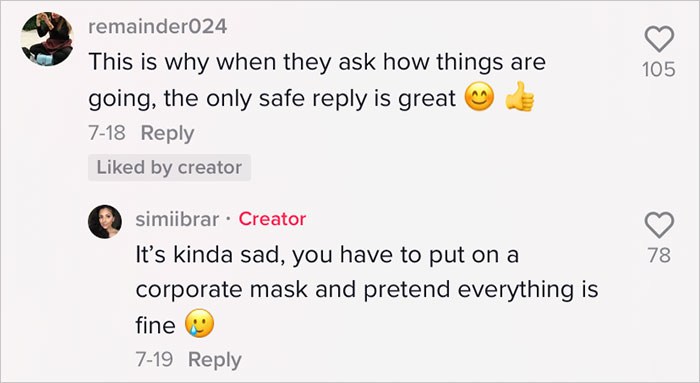
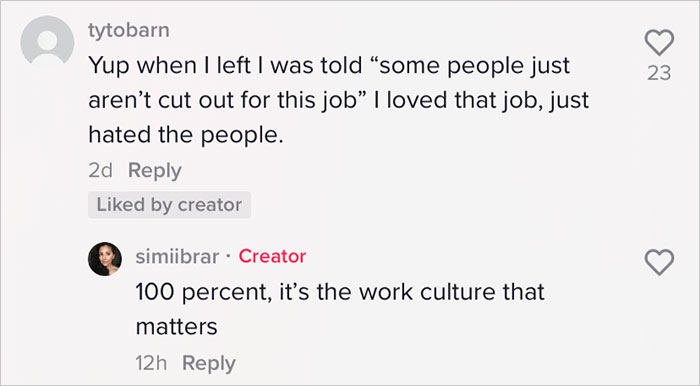
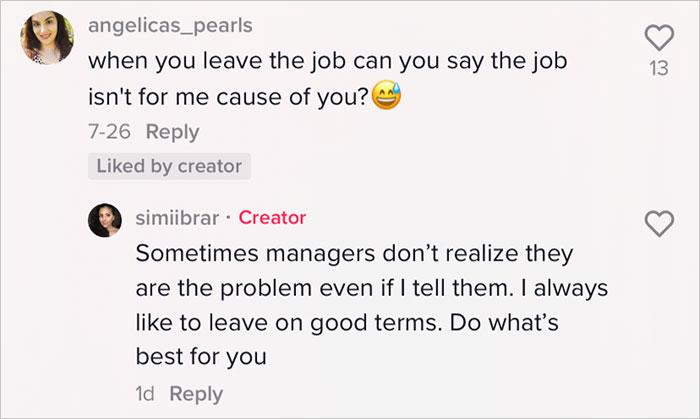



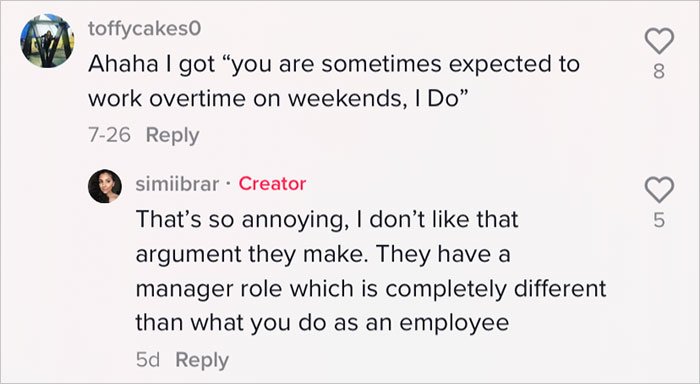


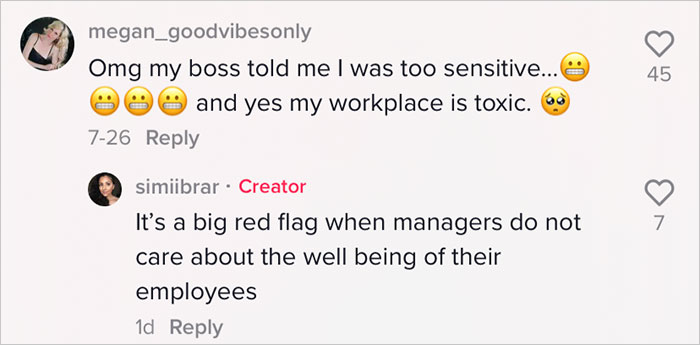









25
3